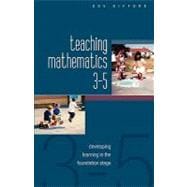
Note: Supplemental materials are not guaranteed with Rental or Used book purchases.
Purchase Benefits
Looking to rent a book? Rent Teaching Mathematics 3-5 : Developing Learning in the Foundation Stage [ISBN: 9780335216864] for the semester, quarter, and short term or search our site for other textbooks by Gifford, Sue. Renting a textbook can save you up to 90% from the cost of buying.
Sue Gifford currently works at Roehampton University, UK.
Section 1
What do we know about how young children learn mathematics? A holistic approach
1 Cognitive processes
2 Emotional processes
3 Social processes
4 Physical processes
Summary of Section 1
Section 2
Practical Pedagogy
5 Contexts for learning
6 Interactive teaching strategies
7 Teaching systems: planning and assessment
Section 3
The mathematics curriculum
8 Number
9 Shape and space
10 Measures
11 Problem solving
Conclusion
References
Index
The New copy of this book will include any supplemental materials advertised. Please check the title of the book to determine if it should include any access cards, study guides, lab manuals, CDs, etc.
The Used, Rental and eBook copies of this book are not guaranteed to include any supplemental materials. Typically, only the book itself is included. This is true even if the title states it includes any access cards, study guides, lab manuals, CDs, etc.